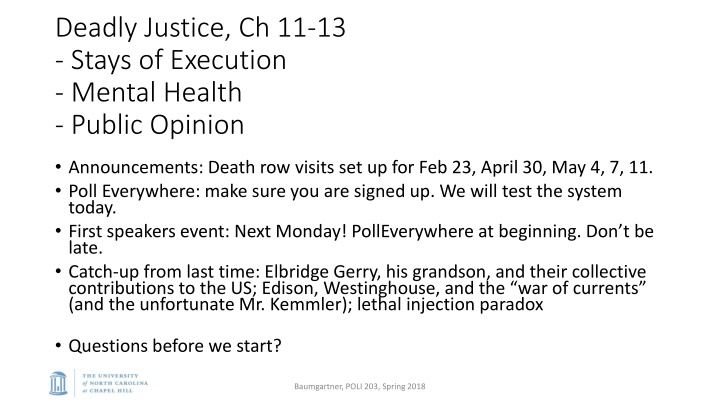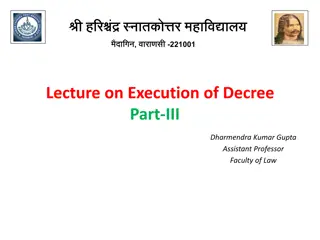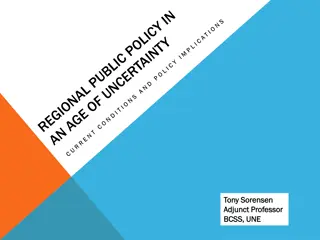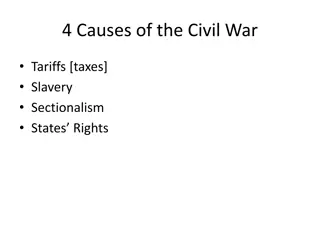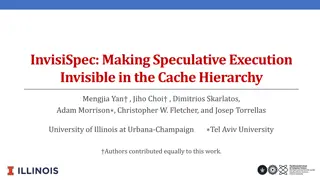Stays of Execution: The Uncertainty, Torment, and Legal Battles
Delve into the unsettling world of stays of execution, where the threat of death looms over inmates, only to be temporarily lifted, leading to a cycle of anguish and relief. Explore the commonality of stays, the legal complexities, and the emotional turmoil faced by those awaiting the ultimate fate. The paradox of seeking a stay as a defense strategy while enduring mental torture adds layers to this intricate system. Join the discussion on the intricate dynamics and ethical implications of this legal process.
Download Presentation

Please find below an Image/Link to download the presentation.
The content on the website is provided AS IS for your information and personal use only. It may not be sold, licensed, or shared on other websites without obtaining consent from the author.If you encounter any issues during the download, it is possible that the publisher has removed the file from their server.
You are allowed to download the files provided on this website for personal or commercial use, subject to the condition that they are used lawfully. All files are the property of their respective owners.
The content on the website is provided AS IS for your information and personal use only. It may not be sold, licensed, or shared on other websites without obtaining consent from the author.
E N D
Presentation Transcript
Deadly Justice, Ch 11-13 - Stays of Execution - Mental Health - Public Opinion Announcements: Death row visits set up for Feb 23, April 30, May 4, 7, 11. Poll Everywhere: make sure you are signed up. We will test the system today. First speakers event: Next Monday! PollEverywhere at beginning. Don t be late. Catch-up from last time: Elbridge Gerry, his grandson, and their collective contributions to the US; Edison, Westinghouse, and the war of currents (and the unfortunate Mr. Kemmler); lethal injection paradox Questions before we start? Baumgartner, POLI 203, Spring 2018
Stays Death Warrant: signed (usually by the governor) setting the date and time of your execution. Typically 30-90 days in advance. Differs by state, of course. DPIC page on upcoming executions. Some are scheduled YEARS ahead of time. https://deathpenaltyinfo.org/upcoming-executions Note that so many are cancelled Baumgartner, POLI 203, Spring 2018
Uncertainty and the element of torture Threat of death, relief from the threat, threat again, relief, threat, relief, etc. One natural reaction to those tortured in this manner is to seek to get it over with 1890, Medley: condemned had to wait, in solitary confinement, for 4 weeks, all the time being uncertain as to whether the governor might commute the sentence or if it would be carried out. See Justice Breyer s comment in Glossip, p. 217 of our book. Note: on-again off-again nature of the process includes reversals as well as stays Baumgartner, POLI 203, Spring 2018
How common are stays? DPIC lists all scheduled executions from 2010 through 2015 285 stays 234 executions You can do the math. Stays are pretty common PA database on all death warrants 433 death warrants Almost stayed more than a month before the execution 71 stayed less than 7 days before the date 5 less than 1 day Only 3 executions in PA since 1976, all volunteers Baumgartner, POLI 203, Spring 2018
No comprehensive data, but Stays are not uncommon Lawyers continue the fight right to the very last minute Uncertainty shrouds the process to the end Many inmates have had their last meals several times. Troy Davis example, as we will see later. A paradox: A stay is good news for the defense team, and they seek a stay. But a system with so many stays and so much uncertainty is unsettling and seems akin to torture. No winners on any side here. Baumgartner, POLI 203, Spring 2018
Mental Health Betsy Neill: senior thesis project Constitutional issues Atkins v. Virginia (2002): low IQ prohibits execution (contradicting 1989 Penry v. Lynaugh, holding that it was ok; evolving standards of decency ) Ford v. Wainwright (1986): inmate must understand the reason for execution Several cases: can the state forcibly medicate the person, to make them sane enough? Mental Illness and intellectual capacity separate issues Illness at the time of the crime v. at the time of execution Note: Texas future dangerousness may make illness an aggravator Baumgartner, POLI 203, Spring 2018
Data and results Court and media records from 2000 through 2015 Older data hard to find on-line This probably under-estimates mental illness quite dramatically May not be mentioned in trial May not be mentioned in any news coverage Often requires official medical diagnosis, hospitalization, school records, testing, etc. Many people never get tested, so there could be a lot of illness that was never diagnosed. Note the legal paradox: Low IQ or mental illness may be a mitigator or make you exempt from the death penalty. But it is also very pejorative so IQ test administrators generally seek to nudge up people, especially in school-related cases, where special education is more expensive Baumgartner, POLI 203, Spring 2018
The bottom line: The mentally ill are highly vulnerable. And jurors may be scared of them, or think they have no remorse Baumgartner, POLI 203, Spring 2018
Rates of serious mental illness much higher Volunteers for execution compared to others executed Serious mental illness more common Baumgartner, POLI 203, Spring 2018
How would you respond, as a juror? Inmate is crazy. Abusive childhood, maybe deep anger, anti-social behavior, not sense of what is right , maybe very violent, perhaps sexually violent Crime may be particularly heinous, violent Courtroom demeanor may be inappropriate May not cooperate with his own attorney Turns out, this does not work very well for the inmate Texas: future dangerousness must be considered. Baumgartner, POLI 203, Spring 2018
OK to execute veterans? Those with PTSD from their military service? About 10 percent of those executed have been veterans. Of course, military service may have had nothing to do with their crime. But many appear to have had symptoms of PTSD. Perhaps it makes the crimes more heinous than what a sane person would do. Is that an appropriate aggravator, or should it be a mitigator? Baumgartner, POLI 203, Spring 2018
Public opinion: The Gallup Poll Question: Are you in favor of or opposed to the death penalty for persons convicted of murder? Baumgartner, POLI 203, Spring 2018
See the Gallup web site itself. Every year they give a comprehensive update http://news.gallup.com/poll/221030/death-penalty-support-lowest- 1972.aspx Baumgartner, POLI 203, Spring 2018
Question wording matters Higher support: Generic question Specific individuals such as Saddam Hussein, Timothy McVeigh, Unibomber Lower support: DP v. LWOP v. possibility of parole Young defendant Felony murder cases / accomplice to the crime (very low support) Also note: death penalty is very rare. And people not supporting the death penalty can t be on the jury. So there is something different from answering the generic Gallup Poll question and voting for death. Baumgartner, POLI 203, Spring 2018
A dynamic dyad-ratios algorithm (thank you, Jim Stimson) Baumgartner, POLI 203, Spring 2018
Opinion index: up from 1970s through 1995, then down. Death Penalty and general punitiveness Opinion and actual death sentences Baumgartner, POLI 203, Spring 2018
State by state variation: no impact, huh?! Regions of Texas. Houston not the highest. State by state Baumgartner, POLI 203, Spring 2018
An opinion paradox Generally pretty high levels of support, in the abstract But very low levels of actual use Political leaders have felt the power of public opinion on this Since the mid-1990s, significant declines in support LWOP is available Crime rates have dropped Concerns about innocence / exonerations Several states have abolished, through LEGISLATIVE action, and the politicians did not get booted out. So some big shifts in the last 20 years, as compared to the earlier period Baumgartner, POLI 203, Spring 2018
